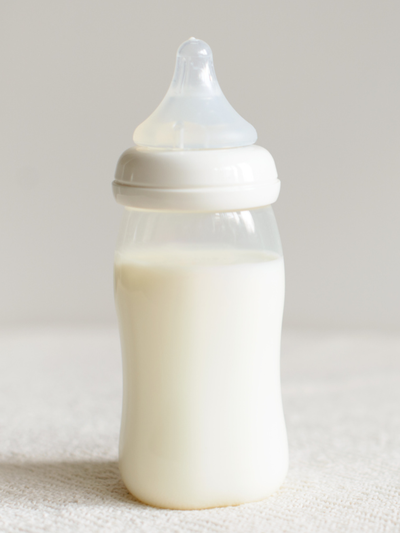

An Expert Guide To Soothing A Baby With Reflux
Lesley Gilchrist
Registered Midwife & Co-Founder Of My Expert Midwife, says…
It’s Extremely Common
“Reflux – when a baby brings up milk during or shortly after feeding – is very common during the first few months. Fifty percent of babies younger than three months will experience reflux, and the condition is regarded as normal in a baby of less than six months old who is well and gaining weight. Any slight movement after a feed can trigger reflux and for many babies, there is no warning sign that it’s about to happen. A baby may feed happily and still regularly spit up, but some babies will seem unsettled or windy prior to experiencing reflux spit ups.”
Younger Newborns Are More Prone
“A young baby is more likely to experience reflux, simply because their digestive system is new and needs time to develop. The lower oesophageal sphincter – the ring of muscle that prevents reflux from occurring – isn’t fully developed in a baby, so a newborn is far more likely to spit up, especially given its stomach capacity is less than 60ml at ten days old. This only increases to 90ml in the first four months. By six months, most babies can tolerate feeds of 120-180ml. Around this time, most babies can sit unsupported, and postural development is a big factor in why reflux tends to resolve soon after a baby starts sitting up more. Spitting up usually peaks at two to four months, and most babies outgrow it by eight months. Reflux is also more likely in premature babies, who have underdeveloped digestive systems.”
Your Baby Could Be Overproducing Stomach Acid
“Milk that is spit up can be mixed with stomach acid, which can make reflux unpleasant and uncomfortable for your baby. It can also be made worse by an overproduction of stomach acid. If you suspect this is the case, consider your feeding position, making sure to feed the baby in an upright position, so its head is higher than the belly button – this will reduce the amount of stomach acid that’s able to flow back into the oesophagus. Keep the baby upright for at least 30 minutes after feeds, too.”
Probiotics Could Be Worth A Try
“Many over-the-counter products aren’t approved for very young children – most are ineffective and some can even exacerbate reflux. It’s important to understand baby reflux differs from adult heartburn and indigestion, so young babies should never take, or be prescribed, antacids. Probiotics, however, are worth exploring, as they can help balance the bacteria in the digestive system to reduce symptoms and support the gut microbiome. Alginates can also help – they contain a natural, biodegradable material that’s non-toxic; when swallowed, it forms a thick gel which sits on top of the stomach contents. It isn’t absorbed into the baby’s bloodstream and works by forming a protective barrier to prevent stomach acid entering the baby’s oesophagus.”
Try Smaller, More Frequent Feeds
“This will prevent the stomach from overfilling, reduce the amount of stomach acid that’s produced and reduce the amount of reflux. Feed responsively and pace bottle feeds, watching for signs of when you should pause feeding, such as your baby splaying their fingers or arching their back. Using a dummy can also help as it stimulates healthy muscle movement in the food pipe, aiding gastric emptying and reducing irritation.”
Patience Is Key
“When feeding, pause frequently and burp using a gentle pat or rub to the back. It can help to imagine the baby’s spine is a column of pound coins and you need to keep it straight. Avoid burping a baby in a slouched position. After feeding, wait at least 30-45 minutes before lying a baby down or putting them in a sling, and when changing a nappy, lie your baby on their side rather than elevating their legs towards the tummy, which may cause pressure and trigger reflux.”
Always Seek Medical Advice If You’re Worried
“Reflux that fails to get better despite lifestyle changes is worth mentioning to your GP. They may be able to prescribe specialised, pre-thickened formula milk or acid-suppressing medication. You should always seek medical advice if your baby is losing weight, failing to gain weight, or cannot keep fluids down; if you see diarrhoea or blood in the nappy; if vomiting is projectile or more forceful than usual; or if a baby older than one is getting reflux.”
Visit MyExpertMidwife.com
Rachel Fitz-Desorgher
Baby & Parenting Expert, says…
It’s Different To The Adult Version Of Reflux
“The reason why parents often think their baby’s reflux is the same as the adult condition is because of how it looks. You know the picture – it’s early evening and your baby has enjoyed its umpteenth feed of the day. But rather than settle into your arms, they arch their back, go red in the face, pump their legs, and start to cry. Nothing soothes them for more than a few minutes and it gets worse as the weeks go by. To us, it looks painful, and because adult reflux causes acid from food to burn the throat, it’s only natural that parents think milk coming up is causing the distress. But it’s actually a gut spasm – the ‘spitting up’ is a red herring and doctors now calling this ‘reflux’ does nothing to help the confusion.”
It’s A Protective Mechanism
“Over the years, the terms colic and reflux have become interchangeable, but what’s less known is that it all comes down to a clever protective mechanism. If you have a newborn, chances are you’re aware that your baby is more unsettled at night and happier in the morning hours – the times of the day when babies are at their most distressed corresponds with increased hormonal activity. These hormones make the gut contract. The word ‘colic’ literally means ‘painful gut spasm’, and babies are wired to drink more breast milk during a colicky moment as human milk is rich in endorphins, which help relax muscles in the gut. Reflux is a protective reflex to stop your baby getting over-full. It may seem ironic that a baby with reflux takes on more milk during their bad weeks, but this is a clever protective mechanism. Even more impressive is that breast milk contains more than a dozen components to prevent acid and actively protect the lining of the intestines, oesophagus and throat. The more affected babies need more soothing, take more milk during their bad moments and so are more likely to spit up.”
Boys Are More Likely To Suffer
“All babies in the fourth trimester are more uncomfortable and unsettled at certain times of the day, but boys are three times more affected than girls. Babies with a family history of eczema, asthma, hayfever, migraine and allergies are also more likely to suffer with colic and reflux.”
It’s All About Soothing Your Baby
“The antidote to the hormone causing your baby’s painful spasms is endorphins, so anything that increases those will soothe your baby. Allow your baby to suck their thumb and avoid using scratch mitts, which can interfere with the hungry signal reaching the brain (hand sucking triggers the brain to know it’s time for food). If your baby is distressed, replicate the gentle movement of being in the womb by rocking or patting at the rate of around 60 beats per minute, which replicates the heartbeat they will have felt from you in the womb. It can take a good 15 minutes to get endorphins going so be patient. White noise can also help.”
Remember It's Normal
“The babies who throw up the most also tend to be the babies who gain weight well, so if you are dealing with reflux, you can be reassured that your little one is really just glugging endorphin-rich milk to soothe a sore tummy and then getting rid of the excess milk it doesn’t need. Looking after a baby with reflux can be tricky and relentless, especially if it’s your first, but research has also shown colicky babies grow up to be more independent, sociable and confident in childhood. This makes sense – colicky babies spend more time being cuddled and reassured.”
Visit TheBabyShow.co.uk
Abbas Kanani
Director at Chemist Click, says…
If You’re Worried, Chat To Your GP
“It’s very common for babies under six months to bring up small amounts of milk, and more often than not, medication isn’t necessary. If your baby gets hiccups, is mildly unsettled, cries or needs burping after feeds, or spits up milk during or after feeds several times a day, this does not require medication. If you notice any other symptoms or if your baby isn’t gaining weight, or if reflux continues after six months, chat to your GP or midwife. Your GP may recommend a certain type of formula that is thicker, or thickening powder such as Gaviscon sachets, which can be added to formula. The aim of this is to retain milk in the stomach, preventing it from travelling back up. If there is limited response, the next step would be to introduce proton pump inhibitors (PPIs), which work to reduce the production of acid in the stomach. Dissolve the required amount (this may be half a tablet depending on what your doctor has prescribed) in a small amount of water – e.g., a tablespoon – and take around 30 minutes before feeding or on an empty stomach. You can administer this via a spoon or a syringe, but avoid taking at the same time as milk, as this can affect absorption.Always speak to your GP before proceeding to treat any of your baby’s symptoms.”
Visit ChemistClick.co.uk
DISCLAIMER: We endeavour to always credit the correct original source of every image we use. If you think a credit may be incorrect, please contact us at info@sheerluxe.com.


